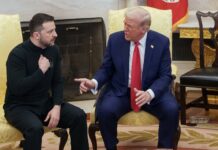This week, much online discourse has been dominated by a debate between Douglas Murray and Dave Smith on the Joe Rogan Experience podcast. The debate featured a wide range of topics that the two commentators discussed, including the wars in Ukraine and Israel, discussions on American foreign policy, and much more. However, the topic that I found to be most interesting was the debate around media and experts.
Around the beginning of the podcast, Douglas Murray made it a point to discuss some of the recent guests that Joe Rogan had had on his podcast over the last few weeks. In particular, the guest appearances of Darry Cooper and Ian Carol. Their appearances on the podcast has been the subject of intense controversy over many controversial statements that have been made by both men during their conversations with Joe Rogan and on their respective platforms.
During his appearance on the Joe Rogan Experience, Darry Cooper caused controversy after he seemingly attempted to downplay some of Hitler’s public antisemitic rhetoric. Darryl Cooper would also claim on an appearance on The Tucker Carlson Show that he believes that Winston Churchill was the “chief villain of World War II.” Ian Carroll would also feature in an episode of the Joe Rogan Experience, where he would spread all sorts of conspiracy theories, some with clear antisemitic undertones.
The point that Douglas Murray sought to get through to Joe Rogan is the scale of influence that Joe Rogan has, therefore he was encouraging him to be more thoughtful about the kind of guests that he has on the podcast. Murray was making the point that it is important to have people with knowledge about the topics they are talking about, to prevent Joe Rogan and his audience from being misinformed by guests that appear on the podcast.
Moreover, Murray sought to highlight the hypocrisy of influencers who talk at length about topics that they are not well-informed on and then seek to claim that they are not ‘experts’ on the topics they speak about when challenged on their assertions. Coming from someone who has been a listener of the Joe Rogan Experience for quite a few years now, and a person who is interested in the field of media and journalism generally, this is something that I have given a lot of thought to as well.
One thing that Joe Rogan and a number of his guests on their platform love to highlight is the importance of independent media like podcasts and YouTube channels such as Joe Rogan’s. Because they are not subject to the same kind of pressures that traditional media outlets are, they have more freedom to express themselves and engage in certain topics that traditional media would otherwise avoid. Moreover, many (particularly right-wing commentators) often accuse the media of purposely spreading propaganda and lies to the public.
And there is some truth in that. There is a lot of potential good that can arise from independent media outlets. There are numerous podcasts that I listen to that do not come from mainstream media outlets that I believe provide a lot of value. Podcast and blogging sites like Substack for example have given journalists and political commentators new opportunities that would not likely be possible at traditional news outlets.
It is just the reality that traditional media outlets have to deal with things like advertising pressure, dwindling revenue streams and putting out content that may alienate their existing audience, and cause them to lose subscribers. For example, the way we’ve seen the Washington Post lose hundreds of thousands of its subscribers over the last year due to some of its editorial decisions. The monumental rise of independent media that we have seen over the last few years, is evidence enough of the value that it has produced for audiences all around the world.
Even this blog is an example of how independent media can give a voice to people who would typically not have one. As I am currently a Master’s student not working at a media outlet, yet I can publish my content for people all around the world to see, if they ever stumble across my blog. However, Just because we have been granted a greater ability to publish content online for potentially thousands of people to access does not mean that every single person has something worth listening to, and this was a big part of the point that Douglas Murray was attempting to make.
The Joe Rogan Experience is the largest podcast in the world and has been for many years at this stage. Each episode of the podcast receives millions of downloads and streams. In addition, clips from the podcast frequently go viral on sites like Twitter, and TikTok. The Joe Rogan Experience is so influential at this stage that in the build-up to the US presidential election, Donald Trump would make an appearance on the podcast in an attempt to speak to voters and rally support.
Moreover, Kamala Harris’ failure to appear on the podcast has been described as one of the biggest failures of her presidential campaign. Joe Rogan would even go on to later endorse Donald Trump for president, showing that even he understands the level of influence he has, otherwise, he would not have even bothered endorsing a presidential candidate at all.
For many influencers and commentators, featuring on the Joe Rogan Experience can lead to a serious boost in their notoriety and following. Many of Joe Rogan’s friends and associates who he has featured on the podcast on multiple occasions have gone on to have incredibly successful careers in podcasting and other avenues. Dave Smith himself is someone who has gained a lot of notoriety as a result of his multiple appearances on the Joe Rogan Experience.
So for Joe Rogan to have Ian Carol and Darryl Cooper on his podcast and give them such a large platform naturally has been the source of a lot of controversy. The kinds of messages that these two figures push especially, can be characterised at their best as being ahistorical, but at their worst can be seen as dog whistles towards more sinister ideologies.
The message that Douglas Murray was attempting to convey to Rogan is that with such a large and influential platform, it is unwise to platform such controversial figures. Especially to give them complete freedom to express themselves without any kind of pushback or accountability for their statements. Murray suggested that Joe Rogan should seriously consider whether he should have such people on his podcast and if/when he does, it would be wise to have experts or historians alongside such figures, who can challenge and hold them accountable for their assertions.
One of the exchanges that I found to be most significant was when Dave Smith implied that it is not his responsibility but rather people in positions of “real power” to re-earn the trust and respect of audiences, not a bunch of podcasters and comedians. And Douglas Murray refuted that by asserting that podcasters like Dave Smith and Joe Rogan do have a lot of power and a lot of influence. This is perhaps the fundamental problem that is present with people such as Joe Rogan, Dave Smith, and the like.
These people would cheer on the downfall of mainstream media outlets and the growing distrust members of the public have for the media. They would celebrate that independent voices, like theirs, are the ones now with real power and influence. Yet when they are called out for their actions, they seek to skirt accountability by claiming that they are not experts. Dave Smith identifies as a comedian however on nearly every podcast he appears on, he goes into in-depth discussions about global conflicts and geopolitics and has grown a sizeable following doing so.
And yet when Dave Smith is called out for some of his actions he seeks to downplay his actual influence, saying that he is just a podcaster and a comedian anyway so no one should be looking to him for any kind of political advice. If independent media is going to continue growing in influence, it must be held to the same standards that apply to traditional outlets. It’s inconsistent—and frankly hypocritical—for these figures to endlessly critique mainstream journalism while sidestepping accountability themselves when it matters most.











